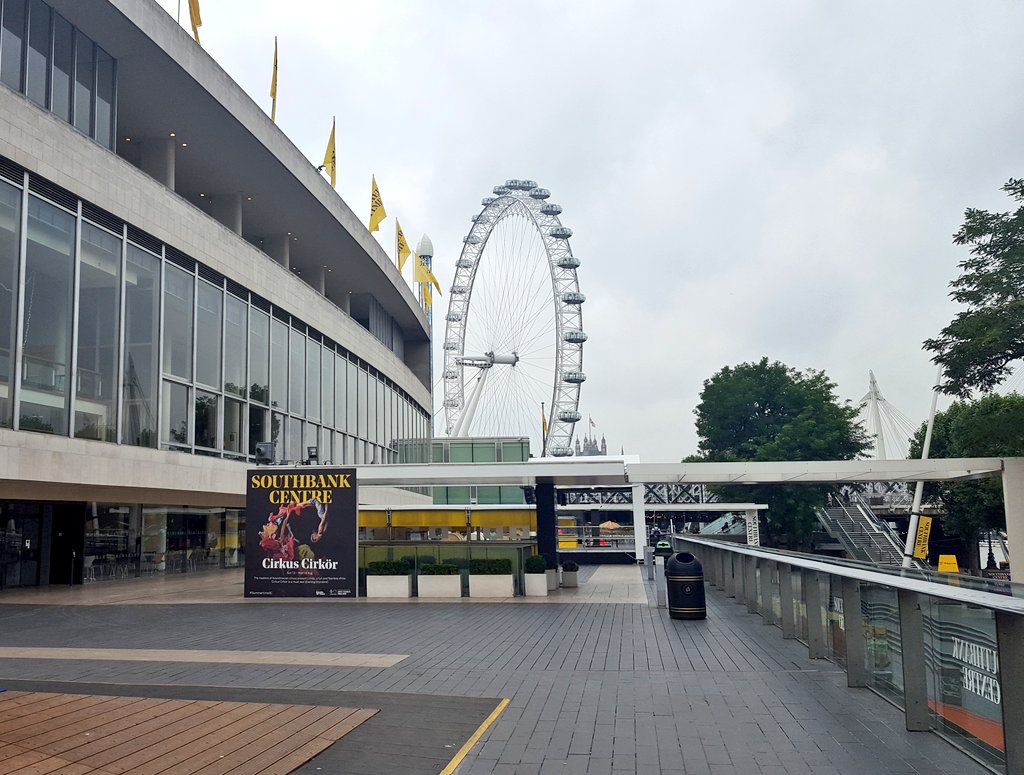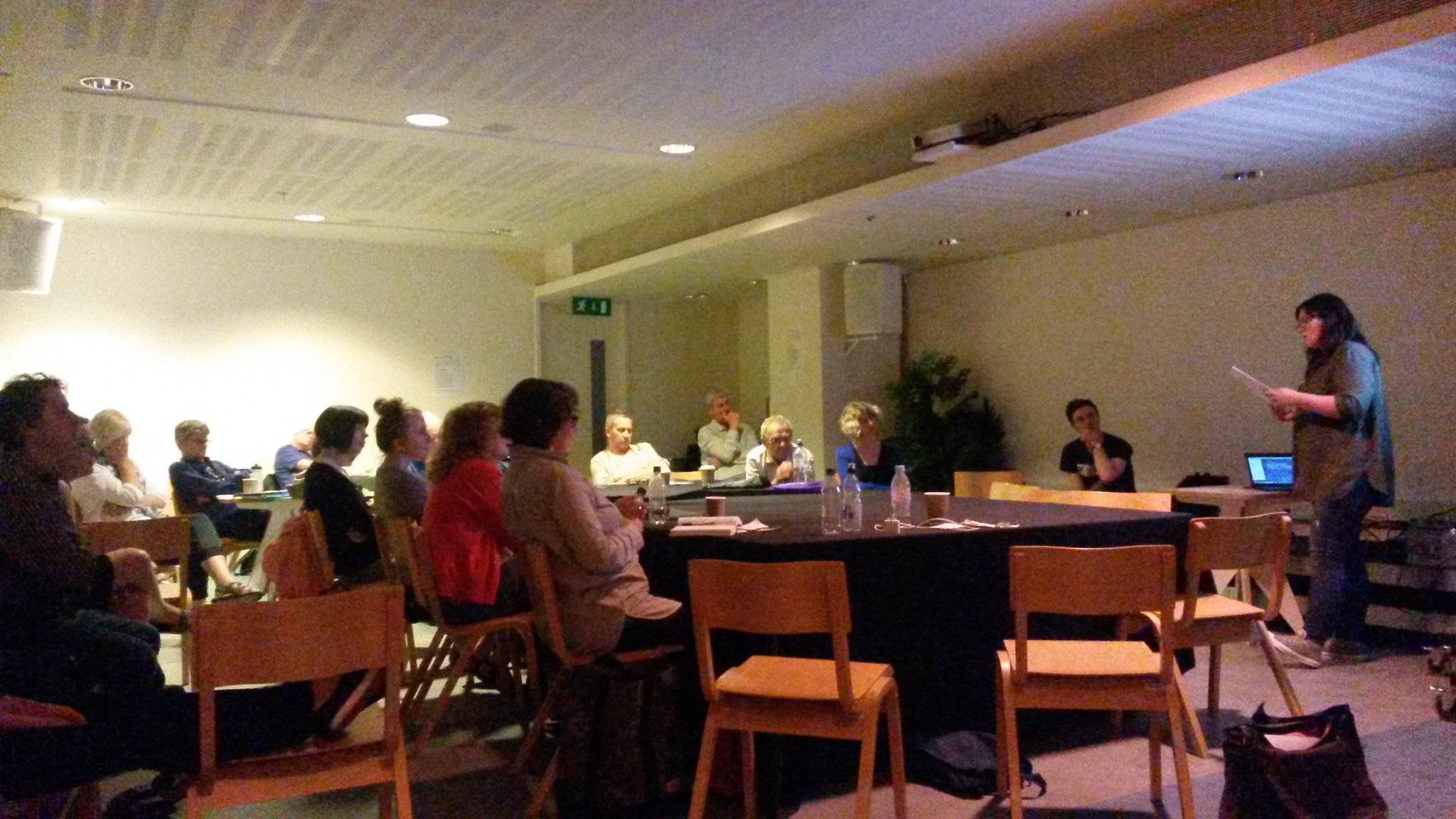 |
| Geet Big Wheel. Photo courtesy of Joanne Clement |
Joanne Clement and I were in London
yesterday, giving a guest workshop-come-poetry reading for the Poetry School’sWriting Poetry MA, a course co-convened with Newcastle University. Converging on
the South Bank, we talked to the students – drawn mainly from London but also
from the Hyem Coonties – about ‘further pathways’: academic routes they may
take post-MA; specifically Creative Writing PhDs and how they might go about
persuading the Arts and Humanities Research Council to fund them to undertake
one.
[The nutshell summary of how to get the
AHRC to fund your creative-practice PhD is this: Come up with an innovative,
original project, driven by a clear research question(s), outline a feasible timeline
through which you will progress and ultimately submit, and apply to work under
the guidance of a supervisory team and School and Institution which will
wholeheartedly benefit your practice by offering you more than just criticism
(i.e. access to specialist archives, a wider research culture and tertiary
training and development opportunities). In short, you need a watertight
project, articulated as an original contribution to knowledge, which you will
conceivably be able to complete in a timely fashion. Ask me whether I’ve
managed all of that in eighteen month’s time, however, and I’ll probably want
to shoot you.]
I read half a dozen poems, two from the
pamphlets, four from The Beast. What follows are some thoughts gleaned off the
back of this particular trip, germinating in the fuzzy line between pedagogy and
practice, but also veering into: the ambiance of being in London post the
multiple terror attacks and Grenfell Tower tragedy; the feeling of disconnect
travelling between Newcastle and London; and the carrying-with of a clearly
demarcated regional poetics whose subtleties, subtexts and intentions do not
always transfer to the metropolis.
After Jo and I had read, thoughts and
comments – which I must say were largely positive – ranged from the evocation
(in both of our work) of a rich landscape, with which some of the students were
not familiar; the difference in rhyme and rhythm to the supposedly more
‘jagged’ aural textures of poetry readings in the capital; and the pros and
cons of writing in such a way, so closely with and about a place, or ‘after’
regional artists (this refers, in Jo’s case, to Thomas Bewick, the 18th-centruy
Northumbrian wood engraver whose tail pieces her thesis investigates, and in
mine to poets such as Bunting and Martin, whose tracks, literally and
figuratively, I follow). I was asked whether I don’t wonder (sub-text: worry?)
if writing in such a strong ‘Geordie’ voice, about the North-East, might not
pigeonhole me as a regional writer (sub-text: with little to nothing to say
about elsewhere?). Interestingly, the prior afternoon, over a quick
lunchtime catch-up with the great London-based poet and comrade, Rishi Dastidar, we mused on similar considerations. Would Faber, for instance, that
bastion of the English canon, protector of all who tread after Eliot, Larkin
And Other Men, be interested in representing the work of a poet who ascribes to
Robert Colls’s view that ‘[New] New Northumbrians [...] were English people who
found other ways of being English’?
I don’t wish to sound mean-spirited
towards my questioner (in fact, if memory serves, I actually thanked them for
both the toughness and relevance of their point, which does pervade my work and
its theoretical underpinnings—there are, after all, no hard and fast rules or
‘answers’), but I wonder to what extent a London poet in London would be
questioned about a ‘Cockney poetics’ (dear me)? Or whether, and this is the
more salient point, why I’ve never really been asked such a question in the
North-East (and why it’s imperative
that, in a reflexive but not overly-postmodern, Aren’t-I-Clever way, my thesis
does its best to get to the heart of the matter)? I was once asked something
similar in North Wales (I paraphrase, but it boiled down to: ‘Do you consider
yourself more Geordie than English?’ I did and do.) Why are poems about the
North-East, or in some way gesturing to a Northeastern consciousness or with a
Northeastern texture or field of semantics, when read or performed in the
North-East, so seldom seen as potentially problematic markers of insularity?
This begets a series of further questions, then. Chiefly: to what extent is the
North-East, as both a geographic space and gallimaufry of cultural or totemic
stories, happy in and of itself, but perhaps unhappy in its position to, and
reception by, elsewheres, principally those hegemonic cultural-capital spaces
such as London, to whom its civic institutions and their purse strings are
beholden? To what degree do we put up barriers, seal ourselves in? To what
extent are our poems – my poems, this is me, Jake Campbell speaking, whether or
not I assume the voice of a collective – translucent? Willing to be seen as figures
behind the glass, but void of telling detail, do they risk ‘trapping’
themselves on Möbius strips; destined to gyrate around fixed points until they,
like the proverbially wound-up toy car, run out of propulsion? Or is there joy
in ploughing that furrow?
I would like to hope that what my poems
actually do is align themselves Internationally-Regionally. Paraphrasing John
Kinsella, that poet of Western Australia whose tendrils of thought and embodied
experience extends to England and Ireland, I aim for something of an international
regionalism in my work: ‘facilitating international lines of communication
while respecting regional integrity.’ If Bunting saw himself, complicatedly, as
a ‘Northumbrian Nationalist’ (or was later held up as a paragon of such), and
contemporary poets are venerated as ‘Northumbrian internationalists’ (see the
blurb to Paul Summers’s collected poems, union,
as proof of this) then why not continue that genealogy, as an imaginative
framework, and couple it with efforts to re-politicise and re-vitalise the
devolution debate?
In an essay in the recently-published Reanimating Regions, Philip Johnstone
makes a case for regional devolution, on the back of both the Scottish
Referendum and Brexit, as one of the only ways to solve what he calls ‘The
crisis at the Centre of the UK’. Johnstone posits that, (rightly) furious at
decades of under-investment (Common parlance: “What have they ever done for us,
like?!”) in the provinces, people mistakenly vented in last year’s referendum
both their legitimate and irrational concerns about their communities’
despoilment by putting a cross on a ballot paper that corresponded with their
acquiescence for the United Kingdom to
divorce from the European Union. What Johnstone suggests they should have done
(be doing) – and Christ knows countless other commentators have said as much –
is instead of questioning the EU (many of whose laws actually directly
advantage those ignored communities, in places like South Wales and County
Durham) question(ed) the failed Westminster model whose political actors and
neoliberal consensus has so wrought inequitable development to London and the
South-East at the expense of nearly everywhere else (See HS2: little more than
a quick-trip to the finance magnet, not a comprehensively thought-out,
long-term strategy for actually, not illusorily, improving the lives of people
in the midlands and Yorkshire.) ‘The marginalisation and inequality felt by
many’, writes Johnstone, ‘have more to do with the problematic nature of the
British state over the past thirty years than with the E.U.’ A more crude way
of formulating this, and again it has been done everywhere from broadsheet
columns to stand-up comic ‘gags’ – is to suggest that, far from rejecting The
Establishment, the Brexiteer was actually ushering it in wholesale.
Where the regional poet, alive to the
frailties of his place and the contradictions of his people, fits into all of
this remains to be seen. It is a project in-progress. Bunting called his poem, Briggflatts, a ‘dialect written in the
spelling of the capital’, and so it seems to me that any considerations of
devolution agendas and how they dovetail into imaginative poetic communities
must embrace both the lexicons we are working with and are constrained by (language
as english, region as top of england [the lower-case ‘e’s there are a
deliberate provocation and enquiry into what might start happening if we remove
the primacy of ‘England’ or ‘Britain’]) and the places they might get us to,
however dreamy or insubstantial they presently seem. Poems, I think, are one of
the best ways of opening up the dreamscape: going beyond theorising what a
region might be, and actually contemplating its possibilities, its chance for
self-determination, and its sympoiesis – making-with – in relation to
neighbouring regions and nations (scotland may yet become Scotland) whose own
territories do not have to be beholden to capitalism at any cost.
Donna Haraway is the scholar from whom
I’ve borrowed ‘sympoiesis’. Writing in Staying
with the Trouble, she says:
‘It matters what matters we
use to think other matters with; it matters what stories we tell to tell other
stories with; it matters what knots knot knots, what thoughts think thoughts,
what descriptions describe descriptions, what ties tie ties. It matters what
stories make worlds, what worlds make stories.’
We are on an
interesting precipice. Confronted with the very real, very exciting, possibility of a Labour
government, led by a committed democratic socialist, we must begin to think of what
any future government deals with places like North-East England, caught between
a still-resurgent Scottish nationalism and a bullish middle England, might look
like. But that’s somewhat putting the cart before the horse, and I think this
is where poetry again becomes vital. In allowing us to confront the inherent
complexities of writing about regions – even, no, especially very ‘well conceived’ [read: stereotyped] ones like the
North-East – poems do what politics alone cannot: they open up spaces for creative
imaginings and retellings. That was why, walking across Westminster Bridge
yesterday, having seen for the first time the steel barriers erected to the
side of the pavement, before spending 30 minutes stuffed into the District line
to King’s Cross, where armed guards stand sentry (as they frequently do at
Newcastle Central), I couldn’t help but be moved by the intricacy and
connectedness of it all, these Times We Live In. When the Prime Minister has
become a parody of a poor leader, yet retains her seat; when hundreds of
cranes populate the skyline of the Thames, constructing new mega office
complexes and luxury flats while people in the West End of Newcastle rob their own food banks, you have to ask, 'How can I help?' Perhaps poet-critics/educators like me, shipped in temporarily for a day to talk
to people, some of whom are twice his age and have had previously successful
careers of their own, can only ask further questions about how and why to write it all down so
that it might, in the writing, make some sense, and touch someone. The
butterfly is beginning to flap its wings, sheet lighting erupts over the Thames
and the Tyne. What it will hide, and what it will reveal, well... that’s up to
the poets before it’s up to the policymakers.
 |
| Jo doing the ready thing; me doing the army thing. Photo courtesy of John Canfield, Poetry School |